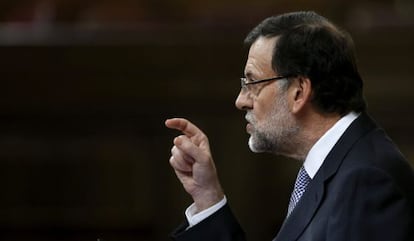Rajoy vows to tackle political corruption with new legal framework
PM’s finances will be audited and tougher sentences introduced for offenders PP leader defiant on country's financial escape act

Mariano Rajoy’s State of the Nation debate pledge to tackle rampant political corruption in Spain was not warmly received by the opposition benches, which considered his proposals a mere Band-Aid on a gushing wound. The prime minister vowed to seek parliamentary agreement on a raft of measures to stamp out what the Spanish public views as an unfettered culture of political profiteering.
Rajoy's ruling Popular Party (PP) has been forced to face down accusations in recent weeks that it has been running a slush fund account, with top officials receiving bonus payments on the side. Rajoy conspicuously avoided mentioning the name of Luis Bárcenas, the former party treasurer whose handwritten records of the PP's off-the books accounting were published by EL PAÍS.
“Spain is not sinking in corruption and not all politicians are corrupt,” said Rajoy in Congress, adding that he believed the majority serve their country with honor. Laying out the framework for a future Transparency Law, Rajoy said that he would be subject to an audit while in office and after his mandate, with his personal finances laid bare. The PP leader also announced tougher penalties, including jail terms, for politicians caught with their fingers in the till. The statute of limitations on certain offenses will be lengthened, Rajoy said.
Nobody outside of Spain believed in us a year ago; now nobody thinks we won't get out of this"
During the first session of the debate, the prime minister said that a statute of public office would be enshrined within a law governing the execution of political functions, which will regulate salary scales, the social protection system and layoff payouts. A department will be created to settle possible conflict-of-interest cases.
The Transparency Law, previously a limited proposal to provide more open government, has taken a turn that Rajoy could not have foreseen at the start of his tenure: the inclusion of political parties, labor unions and business organizations, as the opposition parties have been clamoring for. On several occasions, the ranks of the opposition noted that Rajoy’s proposals had at one time or another already been put forward by the Socialists, the Plural Left grouping and UPyD.
With a palpable air of defiance, the prime minister began his opening speech at just after midday by laying out Spain’s colossal unemployment figure; 5,965,400. He then stated that of these, 4,743,000 are Spanish nationals and the remainder, 1,222,000, immigrants. Rajoy justified the government’s unpopular austerity program and reiterated his commitment to meeting deficit reduction targets. “We will continue with the reforms, without wasting a single moment. Spain has lost enough already.”
“We have avoided the shipwreck that threatened our country,” Rajoy told Congress. “Nobody outside of Spain believed in us a year ago; now nobody outside of Spain thinks we will not get out of this.”
Speaking about a European Council meeting in Brussels last week, where Rajoy spent 36 hours at the table during budget negotiations by which Spain will remain as a net recipient of European funds, the prime minister noted: “Spain will once again be relevant in Europe.”
In a speech marked by the absence of finger pointing for Spain’s current predicament, the prime minister could not resist one triumphal jibe at his predecessor, José Luis Rodríguez Zapatero, who left a similar meeting in Brussels during his legislature as the shadows lengthened – a meeting that did not bring much in the way of positive news for Spain. “Some people left [the table] at midnight and what happened, happened.”
Tu suscripción se está usando en otro dispositivo
¿Quieres añadir otro usuario a tu suscripción?
Si continúas leyendo en este dispositivo, no se podrá leer en el otro.
FlechaTu suscripción se está usando en otro dispositivo y solo puedes acceder a EL PAÍS desde un dispositivo a la vez.
Si quieres compartir tu cuenta, cambia tu suscripción a la modalidad Premium, así podrás añadir otro usuario. Cada uno accederá con su propia cuenta de email, lo que os permitirá personalizar vuestra experiencia en EL PAÍS.
¿Tienes una suscripción de empresa? Accede aquí para contratar más cuentas.
En el caso de no saber quién está usando tu cuenta, te recomendamos cambiar tu contraseña aquí.
Si decides continuar compartiendo tu cuenta, este mensaje se mostrará en tu dispositivo y en el de la otra persona que está usando tu cuenta de forma indefinida, afectando a tu experiencia de lectura. Puedes consultar aquí los términos y condiciones de la suscripción digital.









































